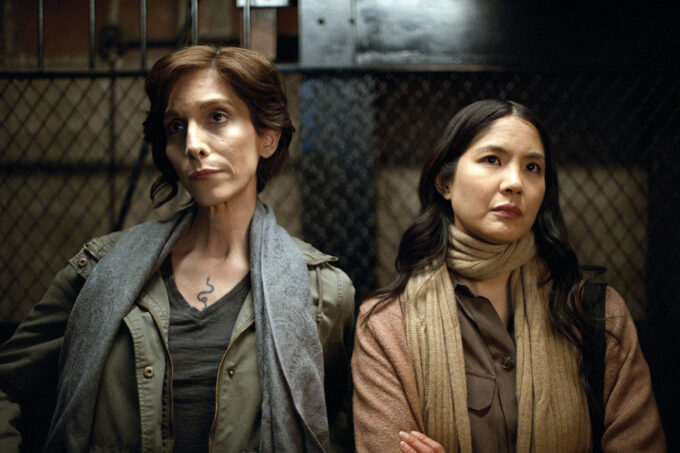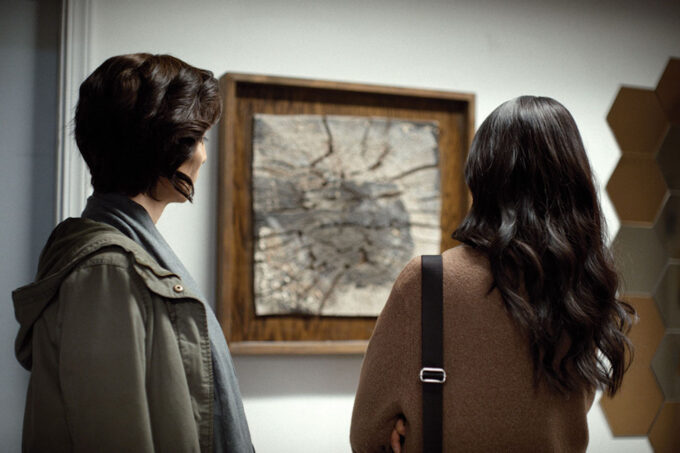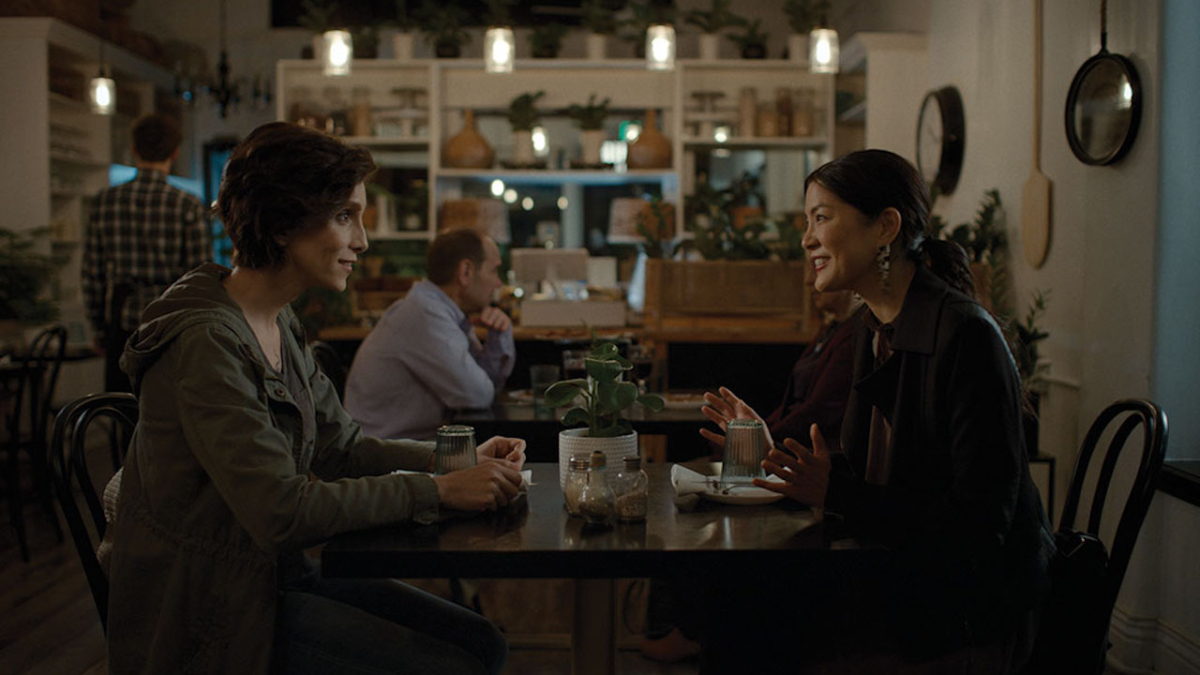Written By: Kyubin Kim
This article may contain spoilers.
Throughout the past few months, we’ve been slowly trickling out of isolation and into “hot vax summer,” and that also meant having awkward conversations with friends we haven’t seen in more than a year. Changes in relationships were inevitable, even with this nostalgic craving to remember the past as it was. Maybe we realized that we grew apart from our friends or maybe we realized that our friends remained the same.
True to this sentiment of getting to know each other again, Mari Walker’s debut narratorial feature “See You Then” takes its course over a single evening as two friends unite after thirteen years. Tech-savvy Kris (Pooya Mohseni) had moved away in a hurry, transitioned as a woman and was now in town for a network security conference. Artist Naomi (Lynn Chen) had stayed behind, now married with two children and teaching at the local college.
Mari Walker’s chamber piece is understated for sure; the core of what we watch on screen is a simple (but artfully paced) conversation between friends. “See You Then” takes place in the fictional town of Chandler, California, which feels like any other American suburb. I found myself easily drawn to the story not only because it was so believable and timeless, but also because the characters and their motivations were recognizable.
When I spoke with director and writer Mari Walker on her debut film, it seemed fitting that the idea for the film also began in a quotidian way. As a practiced editor, Walker was interested in a chamber piece between two characters because she hadn’t done a lot of directing of actors. At the time, she was living with fellow producer and writer Kristen Uno and going through a lot of upheaval. Walker remembers, “I had just transitioned and [Kristen] had just moved to Los Angeles and changed careers to go into film. We were both asking a lot of questions about the choices we had made to get to where we were, what sacrifices we made, our goals and dreams we had when we were younger and whether they have morphed or changed.”
The film is not purely autobiographical, but elements of these tangible conversations, personal experiences and vulnerabilities belonging to Walker are intimately written into the characters. The film begins with Kris and Naomi meeting at a restaurant. When the waiter comes around to take their orders, he recognizes Naomi as a frequent customer with a usual order while Kris chooses to order a Caesar salad, a choice that shocks Naomi. From here, the tension between the two old friends begins to emerge, between one friend who stayed and settled and another who left, starting a new life.
“You completely went after what you wanted,” Naomi admires longingly (and almost jealously). Kris bristles at her transition being referenced as something done out of a “want,” and instead points out that it was for survival. The subtle resentment that bubbles out of this seemingly innocuous conversation is only augmented when it is revealed that Kris and Naomi were ex-lovers prior to Kris’s transition.
The greatest strengths of “See You Then” are its simplicity and its self-assured rawness. The chamber piece relies heavily on emotionally mature dialogue. Unexpectedly though, Walker admits that dialogue was not her strongest suit. To help, she and Uno would read the script out loud. Kristen Uno often played Naomi and Mari Walker would play Kris. In the climactic argument scene, Walker remembers really feeling it, “I just started ad libbing, throwing Uno off, and just yelling at her.” Uno paused and responded, “I think it’s ready. If you’re that willing to commit to a read-through, and you don’t like hearing your own voice, then it’s evolved into your own character.”
While the writing was something great in itself, Walker acknowledges the feats of her actors who brought the characters to life. She had seen Pooya Mohseni in a festival short and praised, “There are some people who are great emotional conduits, who are able to push out the emotions they are feeling internally. There’s a key inside of [Mohseni] that could unlock the complexities of Kris and her character.” As Walker set out for the dreaded audition process to search for the perfect Naomi to complement Kris, she remembers that Lynn Chen was the first actor to come with a friendly and warm energy. Chen had just finished directing her first film “I Will Make You Mine” (2020) and instantly connected with Mohseni during their first read.

When a story is as intimate as this two-character film, the balance and pacing of the story is important to keep the viewers rapt and invested. After Kris and Naomi finish dinner, they grab drinks together, where conversation becomes more weighted. The topic of kids comes up, with Naomi expressing her regrets over her stunted career and unhappy, “ordinary” marriage. Kris listens but sorrowfully admits her inability to have kids even though she wants to. This sets up a central pressure on their mending relationship; motherhood is fraughtly tied up with womanhood, as something achievable, and a choice only for some women.
The story reaches its climax when Kris and Naomi decide to visit the art gallery at their old college where Naomi confronts Kris about the elephant in the room: the unresolved debris of their breakup. Kris accuses Naomi of giving up and settling while Naomi accuses Kris of her avoidance. Kris retorts back, “But you’ve no one to blame but yourself … It’s no wonder you don’t perform anymore. You can’t. Art requires truth. And you haven’t had any truth in your life for a very, very long time.”
Kris and Naomi’s relationship ends here, at an irreconcilable impasse. Mari Walker says, “I fell in love with those characters and felt really bad ruining their lives. But that’s the nature of drama — you’ve got to give a little bit of pain and a little bit of bittersweet.”

The film concludes with Naomi performing an art piece called “Lives Unlived” dedicated to Kris. Naomi, donning a white jumpsuit, kneels and touches her plaid shirt, skirt and underwear laid out on the floor. She lays on her back and cradles her knees. Naomi opens a vial of her blood and pours it into a bowl of white paint and begins painting a curled up fetus. She lays down, curled next to it. Naomi then cuts the fabrics in the performance piece, tearing the fetus into pieces with scissors. I spoke to Mari Walker about her choice to integrate a performance piece. Walker cited the importance of cross-pollination, trying different art forms at the same time and absorbing all of them to form something great.
Performance art especially resonated with Walker who says, “Performance art is based on subversive art, controversial art, it can push limits, break barriers and be aggressive in all those ways. It can be very freeing.” Walker had creative consultant Jayson Morgan and performance artist consultant Lara Salmon (both close friends of hers) rework the performance in detail throughout the night before filming.
Walker hopes that viewers, regardless of how little they have in common with the characters on screen, are able to recognize pieces of themselves in our shared humanity. She finds that, “There’s a universality that can be made in film that’s so beautiful, that can transcend language and transcend these barriers that we put up.” It’s easy to call “See You Then” as a subtle, muted film in the way that it captures a quieter snapshot of ordinary people’s lives. At the same time, simplicity does not sacrifice its subversiveness, but offers opportunities to amplify it.
“See You Then” makes its East Coast premiere at the 44th Asian American International Film Festival. Ticket and screening information can be found here.

